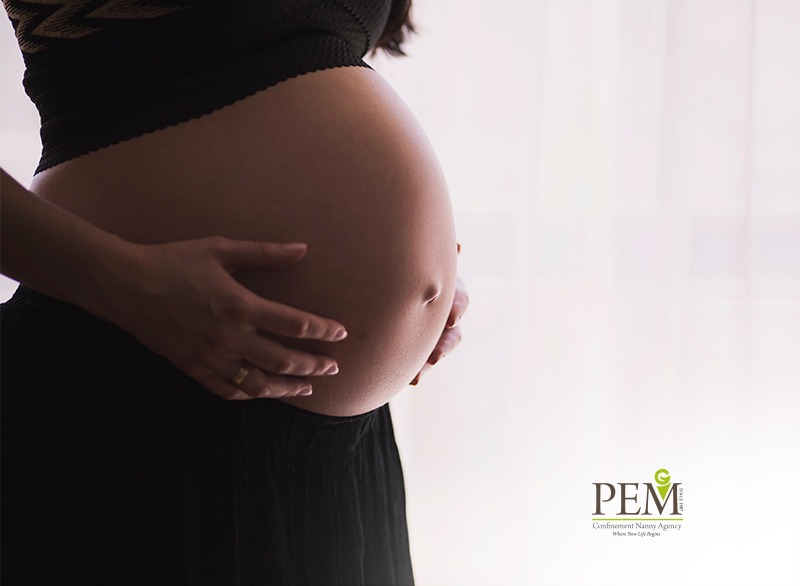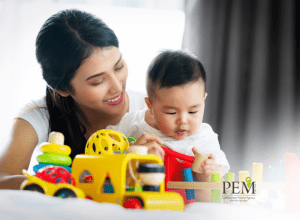[email protected] ♦ (+65) 6293 9249 ♦ Mon - Sun : 10:00AM - 7:00PM
Common Pregnancy Symptoms and Easy Ways To Manage Them

Body changes during pregnancy can feel overwhelming at times, especially when you are not sure what will happen and how you can deal with them. The symptoms of pregnancy in each trimester could be different for every woman. Some moms who are carrying their second babies would even experience different symptoms from her first pregnancy. Having said that, being aware of the most common pregnancy symptoms in each trimester could help you manage them better.
First Trimester (Up Until Around the 13th Week)
Tiredness
Tiredness during pregnancy is one of the most common pregnancy symptoms that almost all pregnant women experience, especially during the first trimester. One of the most direct reasons for this is due to hormonal changes in your body, specifically increased progesterone levels. Furthermore, your body is producing more blood to provide the nutrients to your growing baby, which could be the cause of your decreased energy level.
What You Can Do: Try to get at least 8 hours of sleep every night, and take naps during the day if possible. Doing some activities that you find relaxing before bedtime could also help you to sleep more soundly. This could be drinking a cup of warm milk or simply listening to relaxing music. Additionally, you can add more foods that are rich in iron to keep you energized, such as spinach, lean meat and beans.
Nausea and Vomiting
Nausea and vomiting are commonly grouped together and referred to as morning sickness, and it is probably the most well-known pregnancy symptom. When you are pregnant, your body will release a hormone called the human chorionic gonadotropin hormone (HCG). The rising level of HCG in your body during the first trimester is believed to be the reason for your pregnancy nausea. On the bright side, medical studies suggest that morning sickness could actually be an indication that your baby is developing healthily!
What You Can Do: You can eat small and frequent meals instead of three large meals; likewise, drink less water during your meals and drink them between meals instead. You can try reducing creamy or oily food in your diet as well. What’s more, you can observe the kind of food or smell that triggers your nausea, and try to avoid them. Other than your diet, improving the ventilation in your room may help too.
Second Trimester (Around the 14th Week – 27th Week)
Lower Abdomen Achiness
As your baby grows, you are likely to experience increasing soreness around both sides of your lower abdomen. This symptom is medically known as round ligament pain, and it usually happens when you have physical movements like walking or exercising. There are two round ligaments at each side of your uterus. As your abdomen expands, the ligaments stretch, eventually causing discomfort around your stomach area.
What You Can Do: Slow down your movement and refrain from quick, sudden movements. For instance, stand up or lie down slowly. In addition, you may consider wearing a pregnancy belly band to support your stomach and ease the discomfort. If you are at home when the achiness happens, taking a warm bath could soothe the discomfort as well.
Constipation
Similar to other pregnancy symptoms, pregnancy constipation is due to the increasing progesterone in your body. This hormonal change will slow down the movement of your body muscles, including your intestines, which results in slower digestion, and eventually constipation.
What You Can Do: Stay hydrated by ensuring you drink enough water throughout the day and increase your fibre intake by eating more food like kale, spinach, and beans. Moreover, try switching the refined carbs in your diet to whole grains like brown rice and wheat bread.
Third trimester (28th Week – Childbirth)
Braxton Hicks Contractions
Braxton Hicks contractions are mild contractions that you feel in your abdomen, and they tend to happen more often and stronger as you are getting closer to your delivery date. While this is a normal sign of your uterus getting ready for labour, seek medical advice if the contractions become painful or frequent.
What You Can Do: Try switching your position or activity when the contractions happen. For example, take a small walk if you’ve been sitting for too long. Additionally, drinking enough water may help to ease the contraction. Enjoying a warm cup of herbal tea or milk could make you feel better too.
You May Also Read this : Confinement: A Refreshment Period after your Pregnancy
Varicose Veins
Varicose veins are enlarged and twisted veins that are visible under your skin. During pregnancy, they can occur in your legs, buttocks, and vaginal area. Compared to the early stage of your pregnancy, you’ll now have more blood flowing in the lower part of your body, which creates pressure on the veins and causes the veins to swell. The good news is, varicose veins are usually harmless, and the situation will generally improve within three to twelve months after childbirth.
What You Can Do: Avoid sitting or standing in the same posture for a long time. Furthermore, try not to cross your leg when you are sitting. When you are sitting or lying down, lift your leg from time to time to improve blood circulation.
Endnote
If you are currently dealing with any of the pregnancy symptoms above, remember that they are all manageable and the situation is not permanent. Instead of feeling down or discouraged, try to see them as a once-in-a-lifetime experience along your journey to motherhood.
With your body going through different changes throughout pregnancy and labour, the one month after your childbirth is the key period for your body to recover. Engaging with an experienced confinement nanny is a popular choice among new mothers for a restful pregnancy confinement.
A great way to get confinement nanny Singapore parents trust is by reading reviews from moms with good confinement nanny to recommend. Check out the testimonials on PEM Confinement Nanny Agency’s website today!







